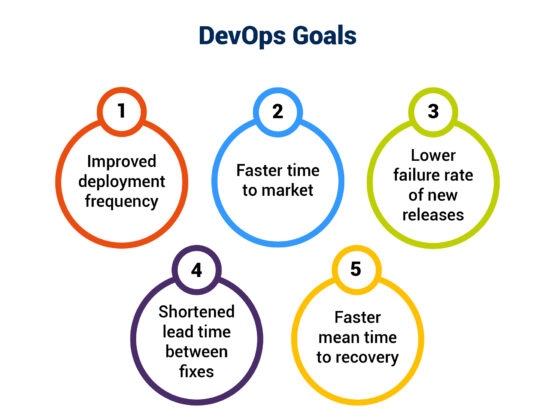CMS IT uses the CALMS framework to implement DevOps in the organization. The five pillars of the framework are:
CMS IT’s approach to DevOps implementation starts with the culture of agile practice, followed by Continuous Integration – Continuous Development followed by Site reliability best practices. CMS IT handles the complete DevOps Lifecycle which includes Code, Build, Test, Package, Release, Configure and Monitor.
CMS IT DevOps Implementation has the following Goals and Approaches


CMS IT focusses on all three aspects of the IT enterprise of an organization to complete the implementation of DevOps.
Continuous Delivery
The risks associated with a release have significantly decreased, and the release process has become more reliable. With Continuous Del, the deployment process and scripts are tested repeatedly before deployment to production. So, most errors in the deployment process and scripts have already been discovered. With more frequent releases, the number of code changes in each release decreases. This makes finding and fixing any problems that do occur easier, reducing the time in which they have an impact.
Site Reliability
- System availability and mission readiness analysis and related reliability and maintenance requirement allocation
- Functional system failure analysis and derived requirements specification
- Inherent (system) Design Reliability Analysis and derived requirements specification for both Hardware and Software design
- System Diagnostics design
- Fault tolerant systems (e.g. by redundancy)
- Predictive and preventive maintenance (e.g. reliability cantered maintenance)
- Human factors / Human interaction / Human errors
- Manufacturing- and Assembly induced failures (effect on the detected “0hour Quality” and reliability)
CMS IT focuses on getting the following done as part of the implementation by balancing out the interests of various groups of IT.
Founded in 2003, by VMware, AirWatch achieved early success in managing wireless endpoints and ruggedized devices. Today, AirWatch is the leading enterprise mobility management provider.
With more than a decade in business, AirWatch continues to develop solutions that empower companies to focus on innovative uses of mobile technology rather than dealing with the complexities of managing mobility.
AirWatch simplifies mobility for organizations, while empowering end users. With AirWatch, organizations can easily deploy, configure, secure, manage and support smartphones, tablets, laptops and other devices across multiple mobile platforms and operating systems. The AirWatch platform includes industry-leading mobile device, email, application, content and browser management solutions.
Our partnership helps in developing a solution which leverages industry-proven enterprise mobility platform and immediately start delivering value to our customers? Whether a network carrier, device manufacturer, technology provider, or systems integrator, we work to identify specific goals and determine how our enterprise mobility solution can help you accelerate your business, reach more customers, and drive additional revenue.
Ready to add Value to your Business Processes?
We’re here to help.



